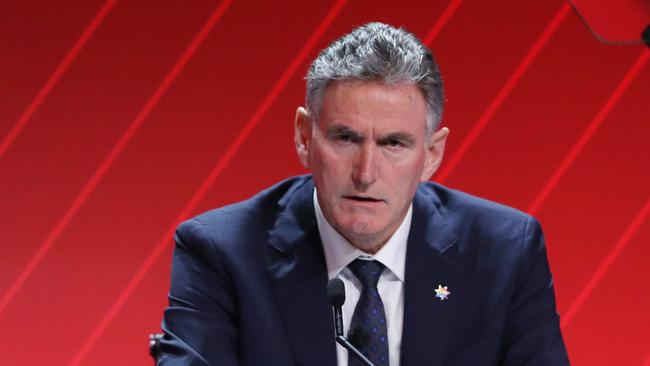NAB’s chief says RBA will move twice more, reveals Ventures business has backed fintechs with exposure to SVB
NAB chief executive Ross McEwan says five small fintechs backed by its Ventures unit had links to collapsed lender Silicon Valley Bank.

NAB chief executive Ross McEwan has tipped two further interest rate rises and revealed five of the small fintech businesses backed by its ventures unit had links to collapsed lender Silicon Valley Bank.
Speaking to The Australian during a visit to Perth on Tuesday, the NAB boss conceded more rate hikes could do further damage to those Australian households already struggling to get on top of rent or mortgage increases, climbing energy prices, and a rise in the cost of food and other essentials.
“That’s the dilemma for the Reserve Bank. How do we slow down inflation when things are feeling okay?” he said.
“Unfortunately, I think we’ve still probably got another couple of rises coming. We are still picking the rate peaking out at about 4.1 (per cent), so it gives you another two rises.”
Mr McEwan said that while the swift collapse of SVB last week would have “next to no” direct impact on NAB’s customers and businesses, it was a reminder of the need to maintain Australia’s strong regulatory regime.
He said five of the small fintech businesses backed by NAB Ventures – the business unit which invests in early stage technology companies – had links to SVB either through borrowings or deposits.
“The fact that the authorities in the US have come out and said deposits will be refunded in full takes a lot of pressure off those businesses, because they would have been over the $250,000 guarantee of deposits in the US,” he said.
“So there would have been a few sleepless nights over the weekend for some of the CEOs and CFOs of those businesses and relief this morning to hear that.
“So there will be an impact and a ripple effect through into some of those businesses if they have to wait for cash. But I also think it shows that you have to have incredibly good regulation on banks and that’s what I believe we have in Australia.”
The swift failure of SVB – which was out seeking capital on Wednesday last week, only to effectively collapse by Friday – showed the value in Australia’s stringent banking regulations.
“The banks should always remember that good regulation of banks is there for a purpose, and that’s to keep banking safe and secure,” he said.
Mr McEwan said the Australian economy was healthy despite the recent procession of interest rate rises and the uncertainty stemming from Silicon Valley Bank’s failure.
He said the persistent feedback from business leaders he met around the country was that the economy was in “pretty good shape”.
“Yes, it’s slowing down and it will feel as though things are really much, much more difficult, but the underlying economy is in good shape,” he said.
NAB’s latest business survey, released on Tuesday, showed that while business confidence was back below zero in February, business conditions across industries and states remained strong. Key measures around trading conditions and employment were still elevated.
Mr McEwan said the bank saw few signs of stress in mortgage arrears or in its credit card book. And the announcement on Tuesday of the $368bn AUKUS submarines program would add to the fundamentals of the economy.
“Australia is in very good shape, and then you lay on to that the very big contracts around the submarines, you lay on all the infrastructure builds that Australia wants to do, you then put 195,000 of immigration coming into the country, and then you say to yourself, ‘well, what’s the impact on housing? It’s going to be positive over time because they’ve got to live somewhere’,” he said.
The ongoing health in the economy presented a challenge for the Reserve Bank after a string of interest rate hikes in recent months.
Mr McEwan called for an increased effort to attract immigrants into Australia, saying it was important for the health of the economy at a time when states have been increasingly competing against each other for workers.
“WA and all the other states should play a very strong game of building the immigration pool into Australia, not stealing off each other,” he said.
“Every state I’ve been in recently and every business I’ve talked to for the last year has said, ‘the one thing holding me back is labour’.”




To join the conversation, please log in. Don't have an account? Register
Join the conversation, you are commenting as Logout